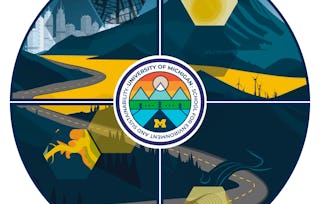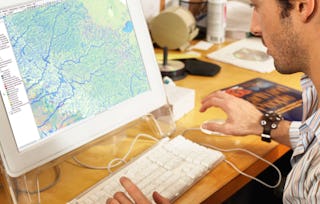In today's globalized world, effective communication among countries and international agencies relies on transferable and compatible technical data. Geographic Information Systems (GIS) provide industry-standard technology and file formats essential for data standardization. GIS integrates graphic software tools and relational data types, widely used by professionals in fields like urban planning, property appraisal, environmental management, and emergency response. It combines vector data (points, lines, polygons) and raster data (remote sensing data with GPS coordinates) to offer powerful decision-making tools for various projects.

GIS Mastery: Spatial Data, Remote Sensing, Decision Support

GIS Mastery: Spatial Data, Remote Sensing, Decision Support


Instructors: Ivelisse Torres
2,333 already enrolled
Included with
24 reviews
Recommended experience
What you'll learn
Acquire key concepts of a Geographic Information Systems.
Identify and analyze the main diverse types of GIS data and professionals.
Apply concepts learned in the course to provide decision making examples with different real-world GIS projects.
Discover GIS data in Public Access databases at different geographic levels
Skills you'll gain
Tools you'll learn
Details to know

Add to your LinkedIn profile
2 assignments
See how employees at top companies are mastering in-demand skills

There is 1 module in this course
Offered by
Explore more from Data Analysis
 Status: Free Trial
Status: Free TrialUniversity of Michigan
 Status: Free Trial
Status: Free TrialUniversity of California, Davis
 Status: Free Trial
Status: Free TrialL&T EduTech
 Status: Free Trial
Status: Free TrialUniversity of California, Davis
Why people choose Coursera for their career

Felipe M.

Jennifer J.

Larry W.

Chaitanya A.
Learner reviews
- 5 stars
80%
- 4 stars
16%
- 3 stars
0%
- 2 stars
0%
- 1 star
4%
Showing 3 of 24
Reviewed on Apr 4, 2025
its an awesome interduction before i even start my bachelors course for GIS, now i got a head start and an advantage to impress my professor.
Reviewed on Feb 28, 2025
Its a very good course to create an understanding of GIS for beginners

Open new doors with Coursera Plus
Unlimited access to 10,000+ world-class courses, hands-on projects, and job-ready certificate programs - all included in your subscription
Advance your career with an online degree
Earn a degree from world-class universities - 100% online
Join over 3,400 global companies that choose Coursera for Business
Upskill your employees to excel in the digital economy

